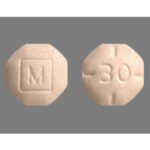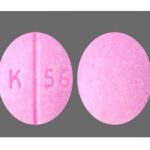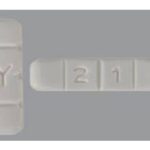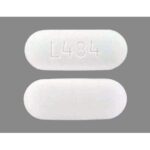What Is A Pill With PLIVA 433 On It?
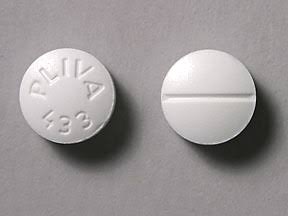
The white round pill with the imprint PLIVA 433 has been identified as Trazodone Hydrochloride 50 mg supplied by Major Pharmaceuticals. Trazodone is an antidepressant medicine that works to balance chemicals in the brain. It’s used to treat depression, anxiety, or a combination of depression and anxiety. It can help if you’re having problems like low mood, poor sleep and poor concentration. Trazodone comes as tablets, capsules and liquid.
PLIVA 433 is not a controlled substance under the Controlled Substances Act (CSA). But even at lower doses, it can cause you to feel relaxed, tired, and sleepy. It does this by blocking chemicals in the brain that interact with serotonin and other neurotransmitters, such as, 5-HT2A, alpha1 adrenergic receptors, and H1 histamine receptors. This effect may be one of the main reasons trazodone works as a sleep aid.
How should PLIVA 433 pill be used?
PLIVA 433 pill is usually taken with a meal or light snack two or more times a day. To help you remember to take PLIVA 433, take it around the same time every day. Follow the directions on your prescription label carefully, and ask your doctor or pharmacist to explain any part you do not understand. Take trazodone exactly as directed. Do not take more or less of it, take it more often, or take it for a longer time than prescribed by your doctor.
Your doctor may start you on a low dose of trazodone and gradually increase your dose, not more than once every 3 to 4 days. Your doctor may decrease your dose once your condition is controlled.
PLIVA 433 pill controls depression, but does not cure it. It may take 2 weeks or longer before you feel the full benefit of PLIVA 433. Continue to take PLIVA 433 even if you feel well.
Do not stop taking PLIVA 433 without talking to your doctor. If you suddenly stop taking PLIVA 433, you may experience withdrawal symptoms such as anxiety, agitation, or difficulty falling asleep or staying asleep. Your doctor will probably decrease your dose gradually.
Other uses for this medicine
PLIVA 433 is also sometimes used to treat insomnia and schizophrenia (a mental illness that causes disturbed or unusual thinking, loss of interest in life, and strong or inappropriate emotions); anxiety (excessive worry). PLIVA 433 is also sometimes used to control abnormal, uncontrollable movements that may be experienced as side effects of other medications. Talk to your doctor about the possible risks of using this medication for your condition.
This medication may be prescribed for other uses. Ask your doctor or pharmacist for more information.
What side effects can this medication cause?
PLIVA 433 may cause side effects. Tell your doctor if any of these symptoms are severe or do not go away:
- headache
- nausea
- vomiting
- bad taste in mouth
- diarrhea
- constipation
- changes in appetite or weight
- weakness or tiredness
- nervousness
- dizziness or lightheadedness
- feeling unsteady when walking
- decreased ability to concentrate or remember things
- confusion
- nightmares
- muscle pain
- dry mouth
- rash
- sweating
- changes in sexual desire or ability
- uncontrollable shaking of a part of the body
- numbness, burning, or tingling in the arms, legs, hands, or feet
- decreased coordination
- tired, red, or itchy eyes
- ringing in ears
Some side effects can be serious. If you experience any of the following symptoms call your doctor immediately or get emergency medical treatment:
- chest pain
- fast, pounding, or irregular heartbeat
- loss of consciousness (coma)
- fainting
- seizures
- shortness of breath
- unusual bruising or bleeding
PLIVA 433 can cause painful, long lasting erections in males. In some cases emergency and/or surgical treatment has been required and, in some of these cases, permanent damage has occurred. Talk to your doctor about the risk of taking trazodone.
PLIVA 433 pill may also cause other side effects. Call your doctor if you have any unusual problems while taking this medication.
PLIVA 433 Safety Information
A small number of children, teenagers, and young adults (up to 24 years of age) who took antidepressants (‘mood elevators’) such as trazodone during clinical studies became suicidal (thinking about harming or killing oneself or planning or trying to do so). Children, teenagers, and young adults who take antidepressants to treat depression or other mental illnesses may be more likely to become suicidal than children, teenagers, and young adults who do not take antidepressants to treat these conditions. However, experts are not sure about how great this risk is and how much it should be considered in deciding whether a child or teenager should take an antidepressant. Children younger than 18 years of age should not normally take trazodone, but in some cases, a doctor may decide that trazodone is the best medication to treat a child’s condition.
You should know that your mental health may change in unexpected ways when you take trazodone or other antidepressants even if you are an adult over age 24. You may become suicidal, especially at the beginning of your treatment and any time that your dose is increased or decreased. You, your family, or your caregiver should call your doctor right away if you experience any of the following symptoms: new or worsening depression; thinking about harming or killing yourself, or planning or trying to do so; extreme worry; agitation; panic attacks; difficulty falling asleep or staying asleep; aggressive behavior; irritability; acting without thinking; severe restlessness; and frenzied abnormal excitement. Be sure that your family or caregiver knows which symptoms may be serious so they can call the doctor when you are unable to seek treatment on your own.
Your healthcare provider will want to see you often while you are taking trazodone, especially at the beginning of your treatment. Be sure to keep all appointments for office visits with your doctor.
The doctor or pharmacist will give you the manufacturer’s patient information sheet (Medication Guide) when you begin treatment with trazodone. Read the information carefully and ask your doctor or pharmacist if you have any questions. You also can obtain the Medication Guide from the FDA website: http://www.fda.gov/Drugs/DrugSafety/ucm085729.htm.
No matter your age, before you take an antidepressant, you, your parent, or your caregiver should talk to your doctor about the risks and benefits of treating your condition with an antidepressant or with other treatments. You should also talk about the risks and benefits of not treating your condition. You should know that having depression or another mental illness greatly increases the risk that you will become suicidal. This risk is higher if you or anyone in your family has or has ever had bipolar disorder (mood that changes from depressed to abnormally excited) or mania (frenzied, abnormally excited mood) or has thought about or attempted suicide. Talk to your doctor about your condition, symptoms, and personal and family medical history. You and your doctor will decide what type of treatment is right for you.

